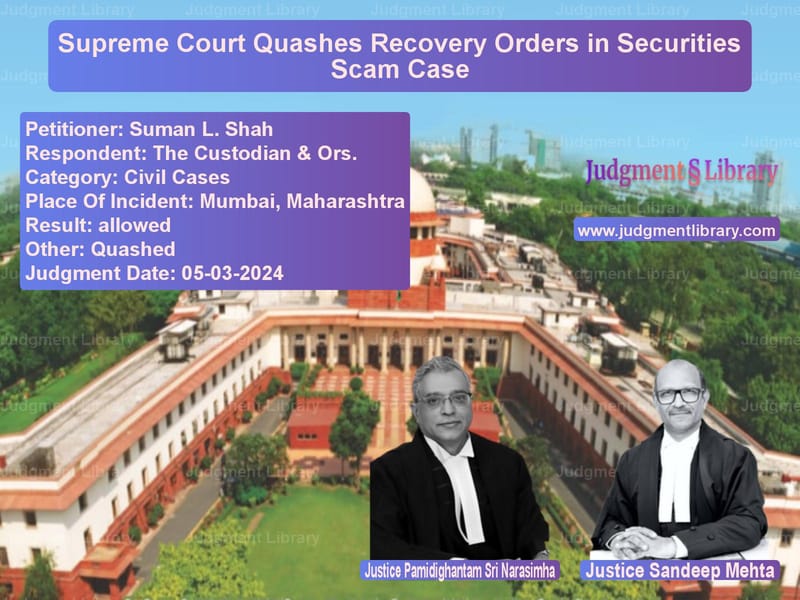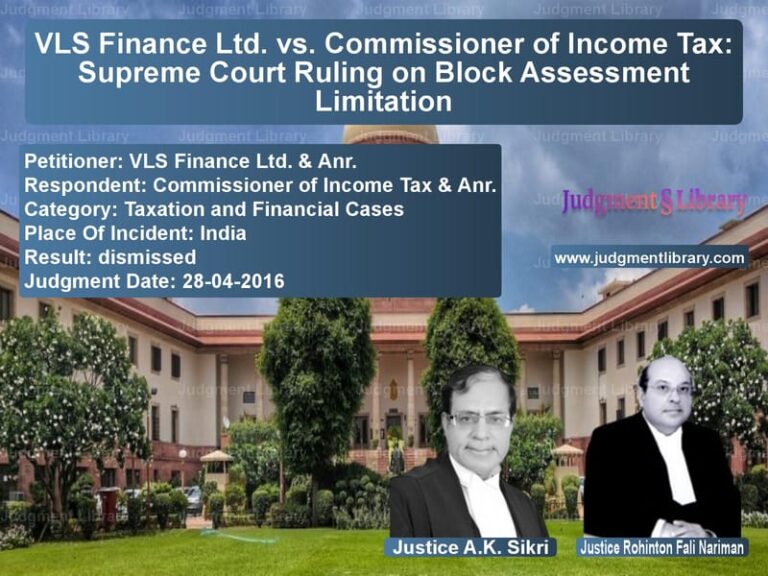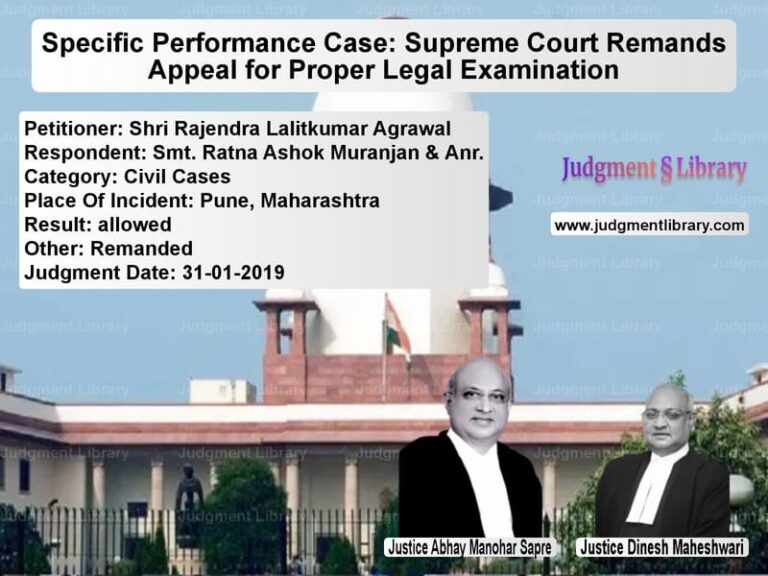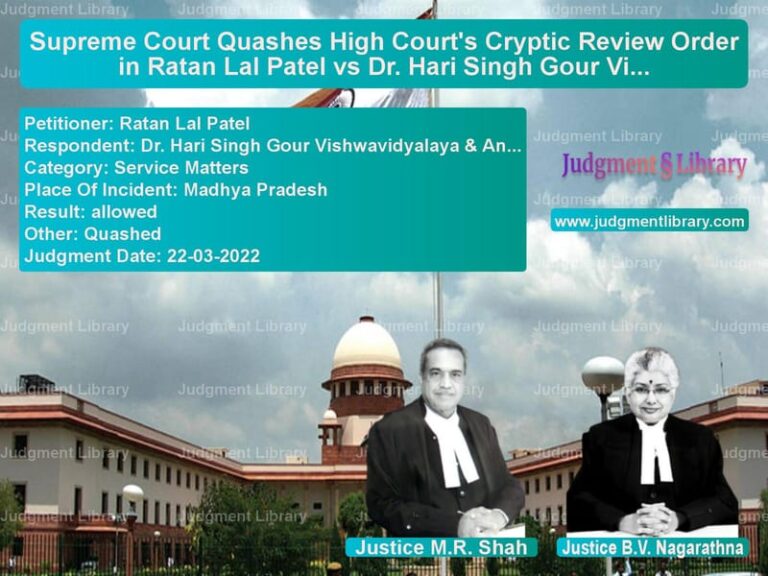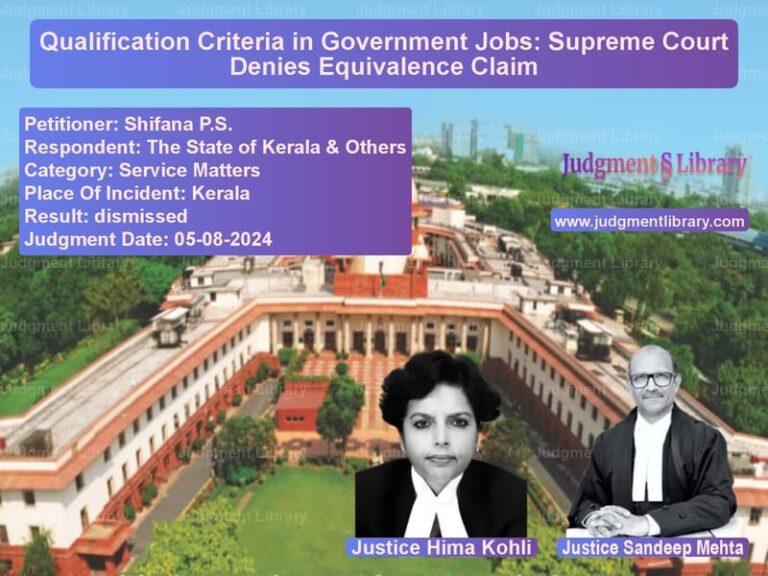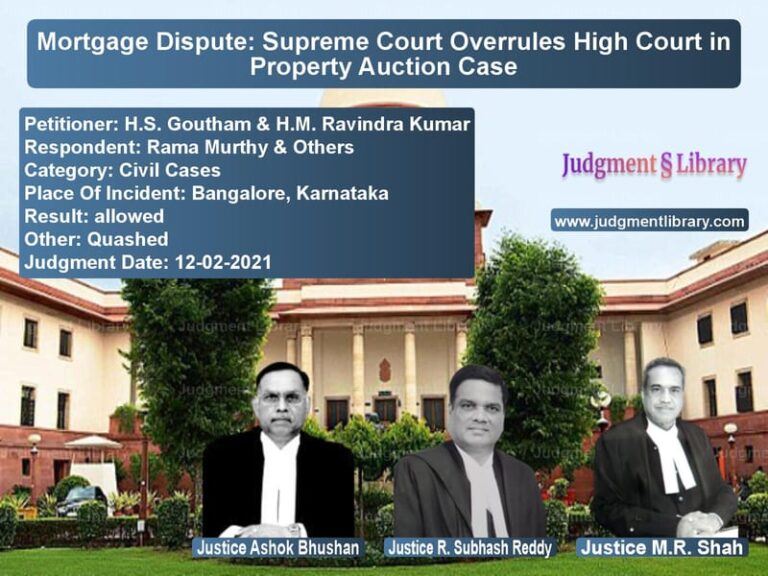Supreme Court Quashes Recovery Orders in Securities Scam Case
The Supreme Court of India recently delivered a significant ruling in the case of Suman L. Shah vs. The Custodian & Ors., concerning the Special Court (Trial of Offences relating to Transactions in Securities) Act, 1992. The case addressed the issue of alleged benami transactions and the liability of individuals who had received money from companies associated with the securities scam of the early 1990s.
Background of the Case
The case revolves around the financial transactions involving Fairgrowth Financial Services Limited (FFSL), a company notified under the Special Court Act of 1992, and respondent Pallav Sheth, who was accused of illegally diverting funds. The dispute concerned loans received by the appellants, Suman L. Shah and Laxmichand Shah, from entities allegedly controlled by Pallav Sheth.
Key facts of the case:
- FFSL was notified under Section 3(2) of the Special Court Act on July 2, 1992.
- In 1993, the Custodian sought recovery of funds from Pallav Sheth, leading to a consent decree on February 24, 1994, ordering Sheth to pay Rs. 51.49 crore.
- When Sheth failed to comply, the Custodian initiated attachment proceedings against his assets.
- In 1996-97, appellants Suman L. Shah and Laxmichand Shah received loans totaling Rs. 120 lakh from companies allegedly linked to Sheth.
- On October 6, 2001, Sheth was officially notified as a party involved in the scam.
- The Custodian later sought to recover Rs. 50 lakh from Suman L. Shah and Rs. 25 lakh from Laxmichand Shah, arguing that these funds belonged to the scam-affected FFSL.
Legal Issues
- Whether the loans received by the appellants from companies allegedly linked to Pallav Sheth were recoverable by the Custodian under the Special Court Act.
- Whether the appellants were “garnishees” (i.e., third parties holding assets belonging to the notified party, Sheth).
- Whether the Special Court erred in directing the appellants to return the money without sufficient evidence.
Arguments by the Appellants (Suman L. Shah & Laxmichand Shah)
The appellants argued that:
- They had taken legitimate loans in 1996-97, long before Sheth was notified under the Act.
- They had fully repaid these loans by a combination of bank transfers and material supplies.
- The Custodian failed to produce evidence proving that the loans remained unpaid.
- The Special Court improperly shifted the burden of proof onto them instead of requiring the Custodian to establish the existence of recoverable funds.
- There was no direct proof linking the loans they received to the illegally diverted funds from FFSL.
Arguments by the Respondents (The Custodian & Others)
The Custodian contended that:
- The companies from which the appellants borrowed money were benami entities of Pallav Sheth.
- Since Sheth was a judgment debtor of FFSL, any money still owed to his companies should be recoverable by the Custodian.
- The appellants had failed to produce concrete evidence, such as account books or vouchers, to substantiate their claim of repayment.
- A 1998 letter from the Income Tax Department indicated that these companies were controlled by Sheth, further justifying recovery.
Supreme Court’s Observations and Judgment
1. Burden of Proof Lies with the Custodian
The Supreme Court emphasized that the Custodian, as the party seeking recovery, had the burden of proving that the appellants were liable to return the funds. The Court stated:
“The Custodian failed to establish that the amounts borrowed by the appellants remained unpaid. The mere assertion that the companies were benami entities of Sheth is insufficient without supporting evidence.”
2. Transactions Preceded the Notification of Sheth
The Court noted that the loans were taken in 1996-97, while Sheth was only notified under the Special Court Act in 2001. It held:
“At the time the transactions occurred, there was no reason for the appellants to believe that these entities were benami or that the funds were tainted. Liability cannot be imposed retroactively.”
3. No Evidence of Outstanding Debt
The Court criticized the Special Court’s reliance on the 1998 Income Tax Department letter, stating:
“The Custodian relied on an unproven document without calling witnesses from the Income Tax Department. This cannot form the basis of a binding financial liability.”
4. Principle of Natural Justice Violated
The Supreme Court found that the Special Court had improperly shifted the burden of proof onto the appellants:
“The appellants provided explanations for how they repaid the loans. In the absence of concrete evidence to the contrary, the Special Court erred in dismissing their claims.”
5. Final Judgment
The Supreme Court quashed the recovery orders issued by the Special Court and ruled in favor of the appellants:
“As an upshot of the above discussion, the impugned judgments are hereby quashed and set aside. The amounts deposited by the appellants shall be reimbursed to them forthwith.”
Implications of the Judgment
This ruling has significant implications for financial fraud cases and third-party transactions:
- Strengthens due process: Authorities must provide concrete evidence before seeking recovery from third parties.
- Prevents misuse of Special Court Act: Individuals who engaged in legitimate transactions cannot be retroactively penalized.
- Clarifies garnishee liability: Merely receiving funds from a later-notified entity does not automatically make a party liable.
- Ensures fair application of securities laws: Third parties must not be held accountable without clear proof of involvement in fraud.
This judgment reaffirms the necessity of adhering to legal principles when dealing with financial recovery cases under the Special Court Act of 1992.
Petitioner Name: Suman L. Shah.Respondent Name: The Custodian & Ors..Judgment By: Justice Pamidighantam Sri Narasimha, Justice Sandeep Mehta.Place Of Incident: Mumbai, Maharashtra.Judgment Date: 05-03-2024.
Don’t miss out on the full details! Download the complete judgment in PDF format below and gain valuable insights instantly!
Download Judgment: suman-l.-shah-vs-the-custodian-&-ors.-supreme-court-of-india-judgment-dated-05-03-2024.pdf
Directly Download Judgment: Directly download this Judgment
See all petitions in Debt Recovery
See all petitions in Contract Disputes
See all petitions in Judgment by P.S. Narasimha
See all petitions in Judgment by Sandeep Mehta
See all petitions in allowed
See all petitions in Quashed
See all petitions in supreme court of India judgments March 2024
See all petitions in 2024 judgments
See all posts in Civil Cases Category
See all allowed petitions in Civil Cases Category
See all Dismissed petitions in Civil Cases Category
See all partially allowed petitions in Civil Cases Category

